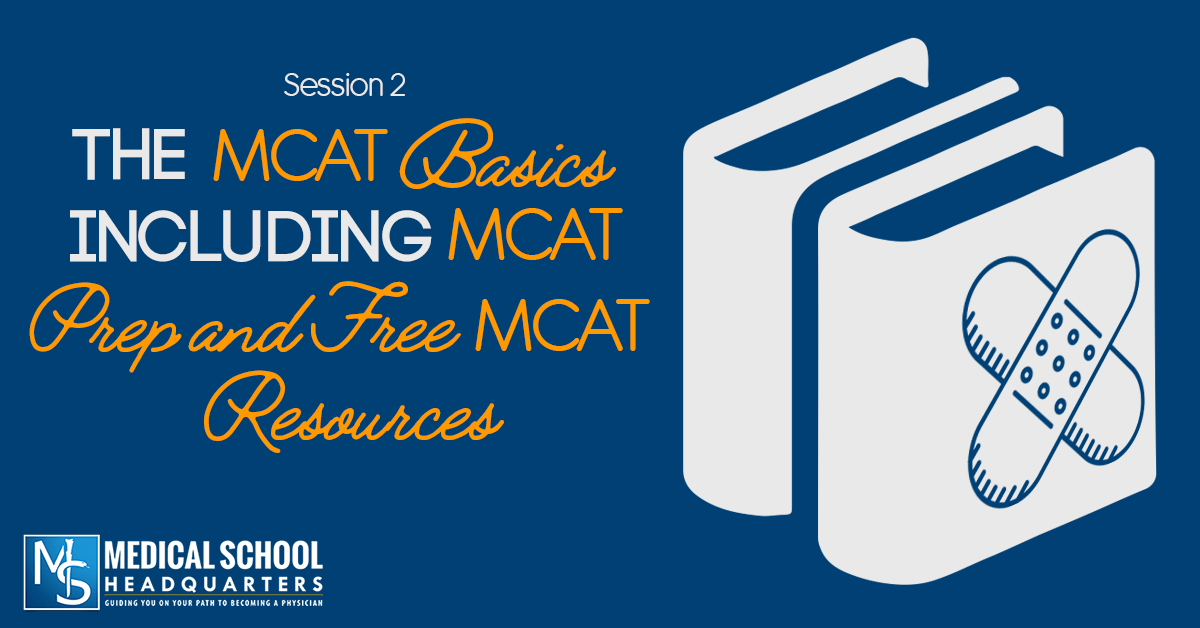
In today’s episode, I cover some MCAT basics including MCAT prep, the new changes in the MCAT 2015, and a ton of free MCAT resources that will help you on your journey.
Listen to this podcast episode with the player above, or keep reading for the highlights and takeaway points.
A 2008 journal article showed that the MCAT compared to other courses has the lowest percentage of questions that are strictly knowledge-based. The majority of it is comprehension.
[Check out my book about the MCAT, co-written with Blueprint MCAT (formerly Next Step Test Prep): The Premed Playbook: Guide to the MCAT.]
Total time: A little over 5 hours
For more on changes to the 2015 MCAT, listen to MCAT 2015: A Review of All the Changes and New Tips.
AAMC offers loads of practice tests as well as MCAT test prep companies like Kaplan and Princeton Review. Start with the official MCAT Guide from the AAMC (that’s an Amazon link to the book).
First, see what it’s like. Don’t worry about studying for it.
[Related episode: Do I Need to Take a Diagnostic MCAT Test?]
Questions will be emailed to your inbox. These are excellent free MCAT resources because they keep you studying even on days without dedicated MCAT study time. Examples:
Check out our MCAT Prep page that has links to some highly reviewed books and other materials.
Flash cards are so handy. They’re lighter than a book and you can take them anywhere and read through them during some free time or while you’re standing on the line waiting for your coffee.
Anki is a computer program that helps you practice spaced repetition with your MCAT flashcards for optimal learning. You can download other premeds’ MCAT flashcard decks—how’s that for a free MCAT resource? Or you can make your own MCAT cards for even better learning.
[Related episode: How to Best Use Flashcards to Study for the MCAT.]
Consider taking Psychology (1 semester) and Sociology (1 semester) in preparation of the 2015 MCAT.
We’ve done episodes of The MCAT Podcast asking “What Is a Competitive MCAT Score?” as well as “What Does the Average MCAT Score Increase Mean for You?”
For MD medical schools, a 511 is the average MCAT score for matriculating students. Therefore, shoot for a 511 or higher if possible. When you score at that level or above, your MCAT score becomes a real asset to your application.
That said, you can be accepted to medical school with a lower MCAT score. In an episode of The Premed Years, I interviewed a student who was accepted with a 496 on the MCAT.
Use the free MCAT resources we talked about in this episode! Use the MCAT question of the day websites. Get your MCAT diagnostic test from Blueprint MCAT (formerly Next Step Test Prep).
The big take-home message from this episode is the fact that the MCAT is a test more about reasoning, understanding, and analysis, not so much pure knowledge.
So read! Read news articles, physical papers, and online newspapers. This helps you hone your reading skills thus increasing your speed of reading and honing your skills to think while you read.
For more tips on how to effectively read MCAT passages, check out episode 259 of The Premed Years.
The MCAT is not a science test. It's a reading and reasoning test that happens to be about science.Click To Tweet
Lorem ipsum dolor sit amet, consectetur adipiscing elit
I just received my admission to XXXXX! This is unreal and almost feels like I am dreaming. I want to thank you for all of your help with my application. I cannot overstate how influential your guidance and insight have been with this result and I am eternally grateful for your support!
IM SO HAPPY!!!! THANK YOU SO MUCH FOR ALL YOUR HELP, IM INDEBTED TO YOU! Truly, thank you so much for all your help. Thank you doesnt do enough.
I want to take a few moments and thank you for all of your very instructive, kind and consistent feedback and support through my applications and it is your wishes, feedback, and most importantly your blessings that have landed me the acceptance!
I got into XXXXX this morning!!!! It still has not hit me that I will be a doctor now!! Thank you for all your help, your words and motivation have brought me to this point.
I wanted to once again express my heartfelt gratitude for your help in providing feedback during my secondary applications. Your guidance has been instrumental in my journey.
Just wanted to share my wonderful news! I received my first medical school acceptance! Thank you for all that you do for us Application Academy!!!
I am excited to tell you that I just got my third interview invite from XXXXX today! I can’t believe it. I didn’t even know if I was good enough to get one, let alone three – by mid-September. Thank you so much for all of your help and support up to this point; I would not be in this position without it!!
I wanted to thank you for helping me prepare for my XXXXX interview. Even in a 30-minute advising session, I learned so much from you. Thank you for believing in me, and here’s to another potential success story from one of your advisees!
I just received an acceptance with XXXXX! This is so exciting and such a huge relief and so nice to have one of our top choice schools! I also received an interview with XXXXX which brings the total up to 20 interviews! Thank so much, none of this would have been possible without you!

Join our newsletter to stay up to date
* By subscribing you agree to with our Privacy Policy and provide consent to receive updates from our company.
Resources
Advising Services
Podcasts & Youtube
Books
About